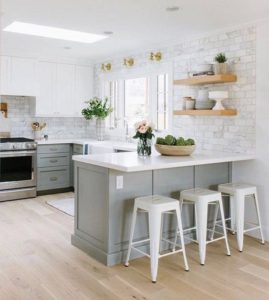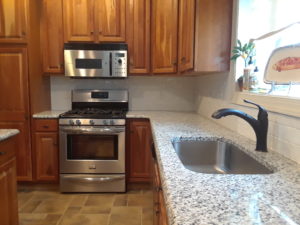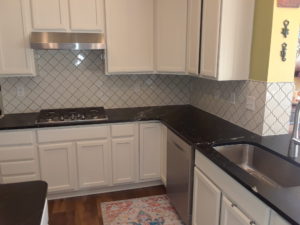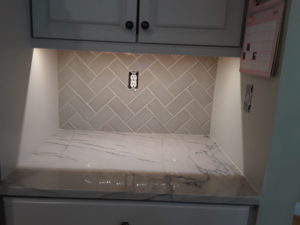A kitchen is a very personal space and every family has different
needs. Each countertop surface will have its own pros and cons, so it
is a highly individual decision what the best countertop will be for
your space.
Quartz countertops have come a long way in the last few years.
Homeowners can expect the cost of a typical 40 square foot quartz
kitchen countertop to start at about $2,300 and increase in price based
on the manufacturer and the popularity of the color. Quartz is a great
surface if you’re interested in a white color or “marble” look. It’s an
engineered material so it takes the natural mineral quartz and mixes
it with resins and epoxies. This makes the surface extremely scratch
and stain resistance, but it can’t handle extreme temperatures quite
like granite, marble, or soapstone.
Granite is a natural countertop surface that will start at less
than $2,000 for a typical 40 square foot kitchen countertop. Granite
will come in a variety of colors and patterns. Typically it will be more
of a speckled or granular appearance compared to other materials.
Granite can handle extreme heat, so don’t worry about resting hot
pots or pans on the surface. It is also extremely resistant to chips
and scratching. Granite does need to be sealed to prevent staining
and every stone will have a different density that will affect its stain
resistance. Often a 20-year warrantied sealer is an easy way to protect
the investment of a porous stone.
Marble is highly desired for its natural beauty. Like granite, it
will range in price from low to high. Marble can handle the high heat
of a pot right off the stove, but is a bit more delicate as it is more easily
scratched. While marble is a porous stone, again a 20-year warrantied
sealer can be used to prevent staining. Etching is a unique characteristic
of marble. Etching is not reversible and can be caused by anything
acidic, i.e., lemon, coffee, wine. Honing the surface can minimize the
appearance of etching and “Anti-Etch” topical coatings are available
as a preventable treatment against both staining and etching on
marble surfaces.
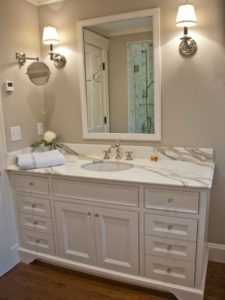
Soapstone typically will come in green, grey, or a black color
palate. It is very dense and, therefore, non-porous and extremely stain
resistant. It is, however, softer than other mentioned options and as
such will develop a “living finish” that will evolve with time. Soapstone
naturally has a matte finish, but specialty wax or mineral oil can be
applied to treat the stone.
Quartzite is a natural material (not to be confused with man-made quartz!). Quartzite is extremely hard and typically at the higher
end of a price range. If you see a too good to be true price on quartzite,
beware! It might in fact be a miscategorized marble. Quartzite should
NOT etch, so a simple test of putting lemon on the surface will reveal the
stone’s truth. Quartzite, like granite, will need to be sealed in order to
prevent staining and will indeed be very resistant to heat and scratches.
While these materials have been highlighted for their value,
durability, and popularity many other countertop options exist such
as wood, Formica, Corian, stainless steel, and even glass! Choosing the
right material may seem like an overwhelming decision, but working
with your color palette and budget can narrow down many of the
options. Kitchen countertops are an investment in your home and
can be a source of enjoyment for years to come.

